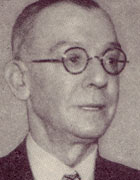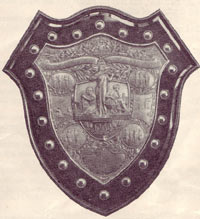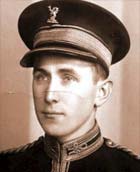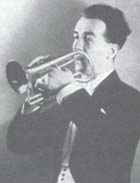British Open Championships - The Open and the War Years
12-Sep-2005This year's test piece may remember the end of the Second World War in Europe, but somehow the British Open survived the priod 1939 - 1944. 4BR finds out what the years were like.
On the 8 May 1945, Britain celebrated the end of the Second World War in Europe. One of the darkest chapters in our history was near to its end and the defeat of the terror of Nazism was greeted with an extraordinary outpouring of communal celebration that although seemingly joyous, was tinged with an immense sense of loss, grief and despair.
The war itself was still raging in the Far East, much of Britain lay in ruin and thousands of families had to come to terms with the loss of loved ones. Churchill remarked that "These are not dark days: these are great days – the greatest days our country has ever lived." They were indeed, yet some 60 years later, it is hard for the younger generations to imagine the sacrifice, fortitude and bravery that the people of Britain gave to the cause of defeating the tyranny of the Third Reich.
It is also hard to imagine what everyday life was also like. Everything that the post war generations have come to accept as normal social functioning ceased when Britain was at war: Rationing of food and clothing, petrol and even sweets for children, the suspension of organized sport, blackouts and propaganda. Everything changed except the British spirit to overcome what was believed were temporary hardships to secure victory.
The keeping-up of moral was also deemed of immense importance, so the limited sporting events, films and ‘entertainment' events such as the British Open Brass Band Championships were not only immensely popular but of vital significance to a people who wanted to show Hitler that the British way of life would not be subdued.
However, with the advent of war in 1939 the future of the British Open was very much in the balance.
The National Finals were suspended due to its location in London, yet the Government had also issued an edict that ‘all places of entertainment must be closed forthwith' and the British Open organizers had in fact sent out notices to bands that the 87th September Contest was to be abandoned.
Thankfully that embargo was lifted, mainly because of the indefatigable work of the contest organizer, Frank Parker, (a man whose name is remembered at the contest on the trophy awarded to the runners-up each year) and on Saturday 30 September, nine bands from an original line up of 22 competed at Belle Vue, Manchester. A contemporary account stated that there was only a ‘reasonable crowd' and that ‘all were carrying gas masks. The contest began after lunch and ended before tea, but the wonder was that there was any contest at all."

The Open was not to be defeated and as Frank Parker himself stated, "We must keep the contest going for as long as possible, in order to keep the movement alive. It will be easier to rebuild after the war if the structure remains."
The 1939 victor on John Ireland's Downland Suite was Wingates Temperance, conducted by William Wood, who beat the Nelson Band into second place by the huge margin of ten clear points, but like many other famous bands of the time, the loss of many players to the forces or to essential civilian jobs meant that the following year the band could not defend its title and, in fact, did not reappear at the contest until 1944. Others too, such as Black Dyke and Besses O' th' Barn found the war years difficult and only managed one appearance at the contest between them.
The foreword in the programme that year declared: ‘Posterity should record the 87th Annual Belle Vue September Championship as being the most vital in the history of the Brass Band movement." British brass banding spirit, guts and determination had overcome its first and most important hurdle and, for the remainder of the War, both the May and September contests continued to take place amidst the air raids and bombs, the losses and final victories.

The following year the contest once more took place on a Saturday, with 13 bands taking to the Kings Hall stage to perform Joseph Holbrooke's rather patriotic Clive of India, a test-piece that included stirring morale boosting episodes such as The Call to Arms, The March to Battle and Victory, and The Victor's Return. Earlier in the year, stiff British resolve was shown when fifty bands competed at the May contest, but reluctantly the July contest had to be cancelled as the situation in Europe grew worse.
A boost to morale was indeed needed, as less than three months earlier over a quarter of a million men were evacuated from Dunkirk, France had capitulated and just a day before the contest, London had sustained the heaviest bombing raid of the entire war.
Once again though, the British spirit triumphed and a week after Bickershaw Colliery's victory, ahead of Creswell Colliery in second and Brighouse and Rastick in third place, (amid two air raid warnings during the morning of the contest) the Battle of Britain had been won, with the RAF shooting down 1733 enemy planes to protect Britain from invasion. As the contest programme noted for its readers: "The 1940 contest will go down in posterity as being held in the most critical period of British history…"
A form of musical rationing took place at the 1941 contest, where the 15 competing bands had the choice of three test-pieces to perform; Academic Festival Overture, Robin Hood or The Crusaders. This was out of necessity rather than musical choice, as many of the competing bands were still depleted by the call to arms and subsequently the standard of performances varied greatly. It also mirrored what was going on in the country as, in the June of that year, clothes rationing commenced and points rationing was just around the corner, whilst in the heat of battle the Bismarck had been sunk and by the end of the year, the Americans had joined the war.
It was still a memorable event though, the winner was the fledgling Fairey Aviation Works Band from Stockport, founded just four years previously and conducted by one Harry Mortimer, who gained the first of what was to become nine victories at the contest playing their choice of Academic Festival Overture ahead of Carlton Main in second place and with City of Coventry in third.
A much more optimistic air surrounded the 1942 contest, with a popular Marching Festival taking place and an increased field of 17 bands taking to the stage to perform a choice of either Lorenzo or Pageantry, although the second movement of Pageantry was omitted.
Fairey's and Harry Mortimer were unbeatable and with a performance of Pageantry that roused the packed King's Hall they took their second successive Challenge Trophy ahead of what was becoming the band's closest rival during the war years, Bickershaw Colliery with City of Coventry once more in third.
 These two bands dominated the Open during the war period. Although Fairey's did not come in the prizes in 1939, and did not compete in 1940, the following years to 1945 saw them win on four occasions and come runners up twice. Bickershaw meanwhile from near Wigan came fourth in 1939 and followed that with two wins, one runners up place, two third places and another fourth place in 1941. Both were packed with the leading players of their time such as Bickershaw's Rowland Jones who went on to become an eminent opera star.
These two bands dominated the Open during the war period. Although Fairey's did not come in the prizes in 1939, and did not compete in 1940, the following years to 1945 saw them win on four occasions and come runners up twice. Bickershaw meanwhile from near Wigan came fourth in 1939 and followed that with two wins, one runners up place, two third places and another fourth place in 1941. Both were packed with the leading players of their time such as Bickershaw's Rowland Jones who went on to become an eminent opera star.
The BBC booking the winners to broadcast to the nation a few weeks later and a young and talented Miss Gracie Cole entertaining the audience at the conclusion of the contest, accompanied by Grimethorpe Colliery Band, further highlighted the sense of optimism.
It seemed the tide of the war was turning and although soap was now rationed and the Japanese had taken Manila, the RAF had begun its first daylight air raids on the Rhur Valley in Germany and the fighting spirit of those determined never to give in to German aggression saw the island of Malta awarded the George Cross.
That sense of slow but ever increasing momentum towards victory was shown in 1943, when a field of 21 bands competed at the 91st contest. Engineering works and colliery bands had been given special dispensation to attend the Open, but even though they could owe much of their playing strength to the fact that a great deal of their occupations were deemed as ‘reserved', it was not a easy option for those who had to work long grueling hours producing munitions, artillery, aircraft and coal.
Still, they did have the majority of the best players on their books and once again the 1943 contest bore this out, with another battle royal between Fairey's and Bickershaw Colliery.
A day before the contest, mainland Italy had been invaded and the Italians had surrendered, whilst earlier in the year the Russians had finally repelled the Germans at Stalingrad and had defeated them at the biggest tank battle of the war at Kursk.
The contest itself was also a battle of musical giants, as Bickershaw conducted by William Haydock produced a superb performance from the number 17 draw on Themes from Beethoven's 5th Symphony, which included the famous ‘Victory' motif at its opening.
They were awarded 194 points from the panel of adjudicators, Herbert Bennett, Henry Geehl and Tom Eastwood, in a judging format that was used at the time that included individual marks for accuracy in time values and notes; tone, tune and individual intonation; rhythm, phrasing, pace and continuity; balance, blend and ensemble and interpretation and general effect. (What would today's performers think of being judged like that!)
 Fairey's were drawn number 20 but, in search of a hat-trick victory, the band was to be denied and had to be content with second place, two points behind and with Creswell Colliery two points further back in third place. It was Bickershaw's second Open victory, whilst Harry Mortimer, never a man to pass by the chance of a future success, led it to its third and final title in 1946.
Fairey's were drawn number 20 but, in search of a hat-trick victory, the band was to be denied and had to be content with second place, two points behind and with Creswell Colliery two points further back in third place. It was Bickershaw's second Open victory, whilst Harry Mortimer, never a man to pass by the chance of a future success, led it to its third and final title in 1946.
By 1944, Churchill's famous remark: "This is not he end. It is not even the beginning of the end. But it is, perhaps, the end of the beginning," was ringing true.
In June, the D-Day invasion had begun and in the following months, allied troops had swept through Italy and had entered Rome. Germany had fired its first V1 rocket on England and a day after the Open, the first V2 had fallen on London. Still, the impetus was with the Allies and soon Paris was recaptured and troops began to close in on the Fatherland itself.
In Manchester, the Open had attracted a record of 23 bands from as far afield as Wales and Scotland as well ensembles from the likes of the Halifax Home Guard, Sankey's Castle Works and ICI (Alkali) in addition to five colliery bands and assorted works outfits.
There was further cause for celebration as the great John Henry Iles had been awarded the OBE in the King's Birthday Honours and as a personal celebration, he conducted the massed bands at the conclusion of the Marching Festival in rousing rendition of Death or Glory.
For Fairey's, it was glory once more, with an amazing 12 point win over the rest of the field with a performance of Maurice Johnstone's The Tempest that Harry Mortimer himself thought one of the greatest he ever conducted. No one came close to them that day, with Creswell their nearest challenges as runners up and with their perennial rivals Bickershaw two points further back in third place.
For many it was a fitting end to the war contests at the British Open, a resounding victory by a band that represented a company that produced the very equipment that helped win the battles in the skies above Europe. Although no one yet knew it, by the time 12 months were to pass the War would be over. The horrors of the concentration camps, the brutality of the campaign against Japan and the deprivation that millions had to endure were coming to an end.
By the time it was ‘The Night to Sing', everything that Britain had fought for had been revealed in its glory and destruction, its horrors and its heroism. The celebration of the end of one of the darkest chapters in history could only have been achieved by the part played by millions of honest, brave people and the moral boosts they were given in a small part by the continuation of the British Open Championships.
Iwan Fox
This article first appeared in the British Bandsman magazine on 2nd September















